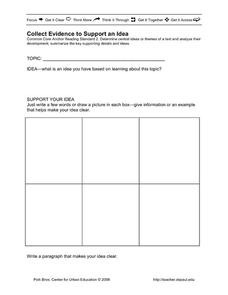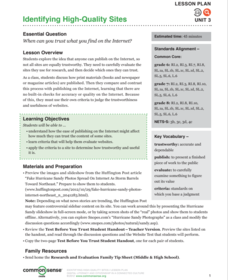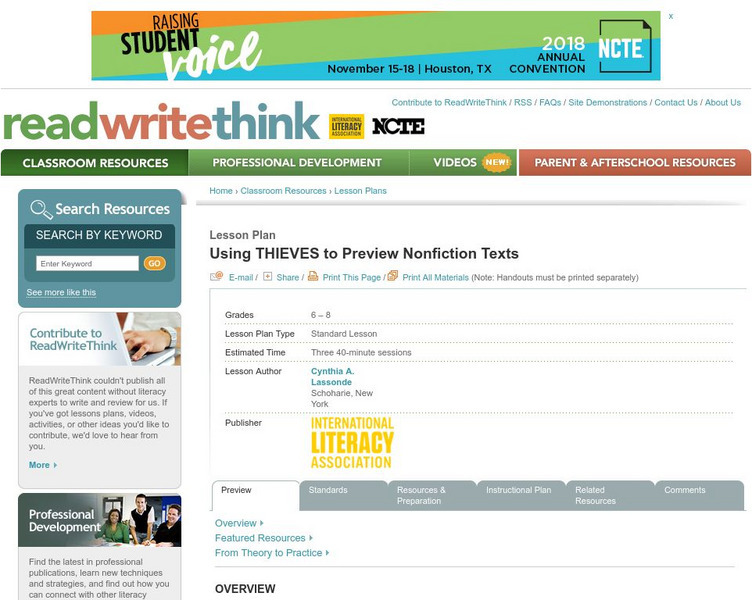Institute of Electrical and Electronics Engineers
Waterproof that Roof!
Stop the raindrops from getting into the house! Eager engineers learn about roofing history and waterproofing by nanotechnology. They get into groups and work on designing a waterproof roof for a small model house. The accompanying...
Vosonos
Interactive Minds: Solar System
Travel through space as you learn about the galaxy, solar system, planets, and much more. An extensive resource for studying astronomy in upper-elementary and middle school classrooms.
Hyperion Publishing
Words We Live By: Your Annotated Guide to the Constitution
The language of the Constitution can feel quite ominous to young learners, but there are a variety of strategies you can utilize to help your class grasp the important concepts and ideals in our nation's founding document. This lesson...
Curated OER
Persuasion in Historical Context: The Gettysburg Address
The Gettysburg Address is a powerful text. Use it to teach persuasion and the importance of word choice. The activity detailed here includes a scaffolded background knowledge activity that includes image analysis of photos from the Civil...
Tallahassee Community College
Finding the Main Idea
A short excerpt at the beginning of the sheet provides middle schoolers with questions to think about when looking for the main idea. Followed by that, learners respond to four reading passages by answering multiple choice questions.
K12 Reader
Biography of Abraham Lincoln
One skill essential to reading comprehension, is learning how to summarize a text. After reading a biography of Abraham Lincoln, readers demonstrate this ability by crafting a brief summary of Lincoln's life.
Polk Bros Foundation
Meet the Nonfiction Main Idea Challenge
Help your class develop the ability to determine a main idea with a packet of materials that you can introduce and use over a period of time. The packet includes some information for the teacher and rationale for the exercises. There are...
Polk Bros Foundation
I Can Infer the Main Idea When I Read
While reading any text, ask your pupils to keep this graphic organizer on hand. They can note down the main idea and three supporting details during or after reading. The instructions allow for individuals to use words or images to...
Polk Bros Foundation
Show, Then Write What You Learn
After reading a text or covering a new topic, have class members fill out the four boxes on this page with facts. Individuals can use words or drawings to represent the facts.
Polk Bros Foundation
I Can Analyze a Story or History Completely and Carefully
Start off analysis of a text with a worksheet that asks pupils to complete several tasks. Class members note down a couple of characters or people and their distinguishing traits, describe the most important event, summarize the text...
Polk Bros Foundation
I Can Comprehend a Paragraph, then a Page/Section in a Text
Help your class tackle chunks of text with a simple graphic organizer. Pupils read three paragraphs and, as they read, draw pictures in the provided boxes that demonstrate what each paragraph says. There are three boxes on the page and...
Polk Bros Foundation
A Way to Analyze Paragraphs to Figure Out the Main Idea of a Nonfiction Text
Shrink up a section by asking pupils to write down the main idea for each of seven paragraphs. There is a space provided for each main idea. When students have completed this portion, they write down what they think to be the central...
Polk Bros Foundation
Collect Evidence to Support an Idea
In order to support an idea, writers must use evidence. Your class members can prepare their evidence with this basic worksheet. Writers note down the topic they are learning about and their own idea. Next, they come up with information...
Polk Bros Foundation
Main Idea Analyzer
Show the connection between the main idea and supporting details with a graphic organizer. Pupils fill in the main idea of a text in the circle and the supporting ideas in the boxes connected to the circle.
Curated OER
Reading Comprehension 2: Level 8
Need a quick assessment of your middle schoolers' reading comprehension skills? The four questions on this quiz ask readers to identify the likely source of the article, define words based on context, and identify the main idea of the...
Common Sense Media
Cyberbullying: Be Upstanding
Peers discuss cyberbullying and how they can defend their friends that may be bullied online and offline. They discover the value in showing empathy for those who have been cyberbullied. Class members then generate multiple solutions for...
Common Sense Media
Identifying High-Quality Sites
Use a Huffington Post article focused on false pictures of Hurricane Sandy to launch a discussion about the reliability of online information. Groups compare and contrast how print and broadcast media regulate data gathering with the...
PBS
Pbs Learning Media: Walmart Middle School Litercy Initiative
Interactive, student-paced lessons on such literacy skills as categorizing, comparing and contrasting, summarizing, evaluating, determining cause and effect, using text features, connecting, inferring, sequencing, understanding problems...
E Reading Worksheets
E Reading Worksheets: Text Structure Practice 1
This interactive learning exercise provides 10 questions: each includes a reading passage which students read and select the patterns of organization used in each passage. RI.11-12.3 Text development
Polk Brothers Foundation Center for Urban Education at DePaul University
De Paul University: Center for Urban Education: Nonfict Readers Analyze Structure/views[pdf]
This graphic organizer contains questions for students as they analyze any nonfiction text. Students will read closely to determine the text's structure, viewpoint, and tone. This graphic organizer is a copyrighted material that may be...
Polk Brothers Foundation Center for Urban Education at DePaul University
De Paul University: Center for Urban Education: History Thinker: Analyze Then Summarize [Pdf]
This Center for Urban Education resource provides a downloadable worksheet. Students will read about a historical event and answer scaffolded questions that will help them retell what happened, explain the causes and effects, and then...
Polk Brothers Foundation Center for Urban Education at DePaul University
De Paul University: Center for Urban Education: Comprehensive Questions: Nonfiction [Pdf]
Questions are provided to help students determine the main idea, topic, and fact versus opinion of a nonfiction piece. Students are prompted to write a summary of an informational text.
ReadWriteThink
Read Write Think: Using Thieves to Preview Nonfiction Texts
Contains plans for three lessons that introduce a nonfiction prereading strategy with the acronym THIEVES, which stands for Title, Headings, Introduction, Every first sentence, Visuals and vocabulary, End Questions, and Summary. In...
ReadWriteThink
Read Write Think: Playing With Genre Through Newspapers and Short Stories
Contains plans for three lessons that ask students to compare narrative writing (short stories) to expository writing (news articles) in order to understand what makes each genre unique. In addition to objectives and standards, this...





















